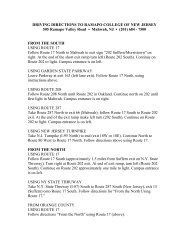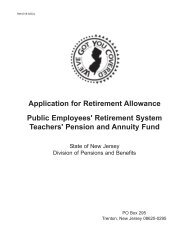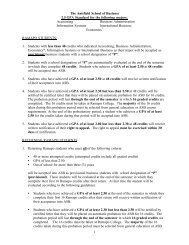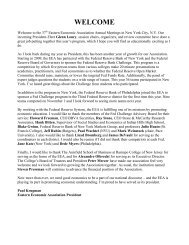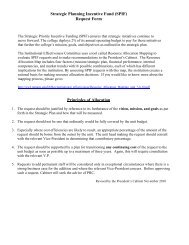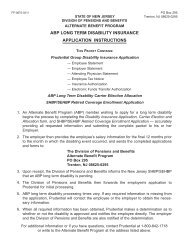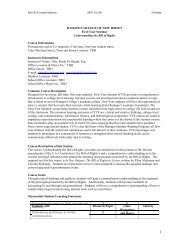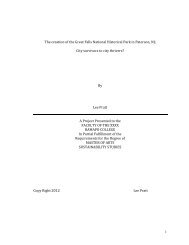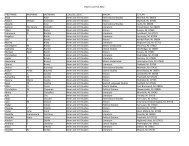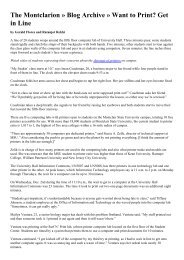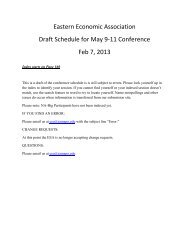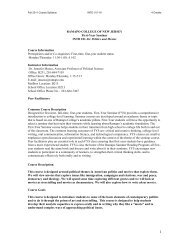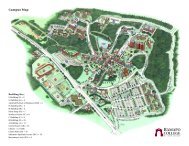Project Manual 11-210C - Ramapo College of New Jersey
Project Manual 11-210C - Ramapo College of New Jersey
Project Manual 11-210C - Ramapo College of New Jersey
You also want an ePaper? Increase the reach of your titles
YUMPU automatically turns print PDFs into web optimized ePapers that Google loves.
Contractor which may be necessary for maintaining heat/cooling whenever heat/cooling is required in the building<br />
whether from the temporary or permanent system.<br />
7.7.4 The Electrical Contractor shall observe the requirements <strong>of</strong> the Federal Occupational Safety and<br />
Health Act <strong>of</strong> 1970 with regard to temporary light and power.<br />
7.8 Temporary Heat, Cooling and Dehumidification<br />
7.8.1 The Contractor shall provide, protect, and maintain all measures to provide temporary heating,<br />
cooling, and/or dehumidification so that the work can progress without delay.<br />
7.8.2 The Contractor shall not assume that the permanent building heating, cooling, and/or<br />
dehumidification system or any part there<strong>of</strong> will be available for furnishing temporary heat, cooling, or<br />
dehumidification. The Contractor's base bid price shall therefore include the cost <strong>of</strong> all equipment necessary for<br />
providing temporary heat, cooling, and/or dehumidification as required under these specifications and guidelines<br />
required by material manufacturers.<br />
7.8.3 All heating equipment shall be NFPA approved and connected to approved flues to the atmosphere.<br />
Gas cylinders within the building shall not exceed 100 lb. capacity, shall have Interstate Commerce Commission<br />
approval and shall be fitted with a permanent cap to protect the valve when not in use. Heaters shall be approved by a<br />
recognized testing laboratory and must be equipped with a positive shut-<strong>of</strong>f safety valve. Cylinders and heaters shall<br />
stand at least 6 feet apart and be connected with two (2) braid neoprene hoses that will withstand 250 psi test pressure.<br />
7.8.4 Storage <strong>of</strong> cylinders within the building will not be permitted at any time. Fire extinguishers shall be<br />
provided by the Contractor on each floor where heaters are used, and the area must be adequately ventilated.<br />
7.8.5 If the permanent building heating, cooling, and/or dehumidification system or any part there<strong>of</strong> is<br />
available for use to provide service during construction and use is approved by the Construction Manager, the system<br />
shall be maintained by the Contractor until turnover <strong>of</strong> the systems to the Owner. All systems shall be cleaned and filters<br />
changed prior to acceptance by the Owner.<br />
7.9 Temporary Enclosures and Partitions<br />
7.9.1 Whenever necessary, in order to maintain proper temperatures for the prosecution <strong>of</strong> the Work, or for<br />
the protection there<strong>of</strong>, the Contractor shall furnish and maintain temporary enclosures for all openings in exterior walls<br />
that are not enclosed with finishing materials. Temporary doors shall be provided at door openings.<br />
7.9.2 The Contractor, at its expense, shall provide and maintain necessary temporary dust pro<strong>of</strong> partitions<br />
around areas <strong>of</strong> work in any existing building or in new building areas as directed by the Construction Manager.<br />
7.10 Temporary Utility Capping<br />
7.10.1 Cap all incomplete lines, ducts, conduits, openings, etc., until ready for final connection, after<br />
which they shall be thoroughly cleaned and left unobstructed. Failure to perform this capping will result in the<br />
Contractor flushing and/or cleaning the material at the Contractors expense as directed by the Construction Manager.<br />
RCNJ <strong>Project</strong> No.: 09-270.1C - 32 -




